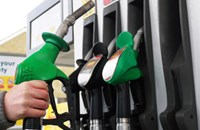
Motorists across the UK are set to shift to a greener fuel with the introduction of E10 at petrol stations in September 2021.
Following a consultation with drivers and industry, the introduction of E10 fuel, which is a mixture of petrol and ethanol made from materials including low-grade grains, sugars and waste wood, will boost the government’s ambitions to reach net zero by 2050.
Its introduction on UK roads could cut transport carbon dioxide (CO2) emissions by 750,000 tonnes a year – the equivalent of taking 350,000 cars off the road, or all the cars in North Yorkshire.
It will also boost job opportunities in the north east, securing up to 100 jobs with the reopening of AB Sugar’s Vivergo plant, and increasing production at existing biofuel plants including Ensus. This will support the UK’s wider bioeconomy by ensuring the materials needed for E10 are produced and refined in the UK.
Transport Secretary Grant Shapps said: "We’re going further and faster than ever to cut emissions from our roads, cleaning up our air as we accelerate towards a zero-emission transport future. Although more and more motorists are driving electric vehicles, there are steps we can take to reduce emissions from the millions of vehicles already on our roads – the small switch to E10 petrol will help drivers across the country reduce the environmental impact of every journey, as we build back greener."
The 2 petrol blends that are currently widely available in the UK contain no more than 5% ethanol, known as E5; the fuel being rolled out in September has up to 10%. Using bioethanol in place of traditional petrol can reduce CO2 emissions and, therefore, increasing the ethanol content of petrol could help us meet our climate change targets.
A small number of older vehicles, including classic cars and some from the early 2000s, will continue to need E5 fuel, which is why supplies of E5 petrol will be maintained in the ‘Super’ grade. We are advising motorists to use the new E10 compatibility checker to see if their vehicle is compatible.
About the UK Department for Transport
 The UK Department for Transport (DfT) work with our agencies and partners to support the transport network that helps the UK’s businesses and gets people and goods travelling around the country. We plan and invest in transport infrastructure to keep the UK on the move. DfT is a ministerial department, supported by 24 agencies and public bodies
The UK Department for Transport (DfT) work with our agencies and partners to support the transport network that helps the UK’s businesses and gets people and goods travelling around the country. We plan and invest in transport infrastructure to keep the UK on the move. DfT is a ministerial department, supported by 24 agencies and public bodies




Comments
There are no comments yet for this item
Join the discussion